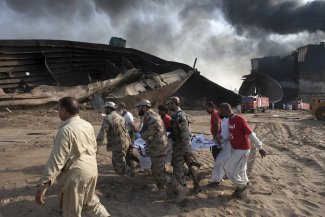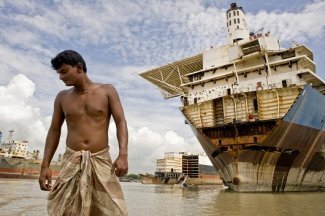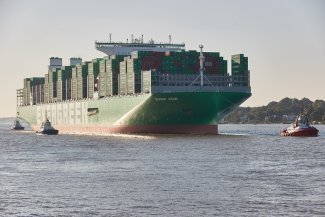Workers at a shipbreaking site in Bangladesh. In this country, according to NGOs, “the life expectancy of men working in the shipbreaking industry is less than 20 years”.
The International Labour Organization (ILO) has classified it as a “major global environmental and health problem”. With the boom in shipping, and the ageing of fleets, the shipbreaking industry has become a goldmine for some and an inferno for thousands of workers, as many owners, to cut costs and maximise profits, send their freight, tanker or cruise ships to dangerous and polluting shipbreaking yards.
These operations are mainly conducted in four countries: Bangladesh, India, Pakistan and Turkey. The first three alone handle over 70 per cent of the world’s shipbreaking, according to the figures of NGO Shipbreaking Platform, an international coalition of organisations denouncing the environmental and human rights abuses in the sector.
According to the Shipbreaking bulletin published by French NGO Robin des Bois, a reference in the field, in June, July and August 2023 alone, 271 boats reached the end of their lives. Of these, 106 (39 per cent) were built in Europe, 88 (32 per cent) were owned by European shipbuilders and 241 (89 per cent) were sent to South Asia for demolition. The rest were sent to China or Turkey. The facilities operating in the rest of the world only account for three per cent of the ships dismantled each year.
Most of the ships to be dismantled are sent to three beaches: Alang in India, Chattogram in Bangladesh and Gadani in Pakistan, where operations are carried out in “terrible and dangerous conditions”, Nicola Mulinaris, senior communication and policy advisor at NGO Shipbreaking Platform, tells Equal Times. Among the most widely criticised practices is that of beaching.
Although international laws prohibit the export of ships to these yards without adequate protections for the environment or workers, many companies manage to circumvent the rules. They sell the vessels they no longer have any use for to intermediaries known as cash buyers or scrap dealers. These intermediaries then change the ship’s flag of origin to flags of convenience from states with little regard for international conventions, such as Comoros, Palau or Saint Kitts and Nevis, and register them under new names and new PO box addresses to make them untraceable.
The boats are then taken to India, Bangladesh or Pakistan, where they are sold to shipbreaking yards. There, at high tide, they are run aground and doomed to wait until the water retreats and the workers can begin dismantling them directly on the beach where the shipbreaking yards are located. “Without containment, such as in a dry dock, the various pollutants in the ships, their equipment or their structures (oily water, hydrocarbons, PCBs, paint, asbestos dust, etc.) spill onto the sand and into the water,” French NGO Robin des Bois tells Equal Times.
447 deaths in 13 years: the hellish conditions on Asian beaches
These toxic substances are also hazardous to the health of the workers, who rarely have the protective equipment needed for the work on such sites. Exposed to deadly toxins, explosive gases and chunks of steel falling during the cutting process, workers at the Alang, Chattogram and Gadani yards risk their lives on a daily basis.
According to the figures compiled by NGO Shipbreaking Platform, since 2009, 447 workers are known to have died working on these sites in India, Pakistan and Bangladesh, and 393 are known to have been injured. The actual figures could be much higher.
“There is a complete lack of transparency from the industry, especially in India, where a lot of the work is carried out and the industry is hiding what is really happening. NGOs are not welcome in those yards,” says Mulinaris, who also spoke of the rampant corruption and illegal practices surrounding these operations. The ILO, for its part, points to the “unacceptably high levels of fatalities, injuries and work-related diseases”.
According to a report published by NGO Shipbreaking Platform and Human Rights Watch (HRW) in September 2023, in Bangladesh, “the life expectancy of men working in the shipbreaking industry is 20 years lower than the average”.
“The companies having their ships dismantled in dangerous and polluting yards in Bangladesh are making profits at the expense of Bangladeshi lives and the environment,” Julia Bleckner, senior Asia researcher at HRW, tells Equal Times. The risks are heightened by the fact that ships left on the beaches are sent for scrapping “in their own juice”, without being depolluted or their tanks being inerted beforehand, increasing the threat of deadly explosions and poisoning for workers.
These employees are all the more vulnerable as most of them are underpaid immigrant workers and many are hired without genuine employment contracts. “We recorded countless labour rights violations, including the lack of paid leave. In the three locations [editor’s note: India, Pakistan and Bangladesh] there is no proper hospital in the vicinity of the yard capable of treating workers’ injuries,” says Mulinaris.
Improvements still far too modest
If these practices still exist it is because some of these activities are particularly lucrative for the countries concerned. Before it became a leader in shipbreaking, Bangladesh used to import all of its steel scrap. Now, it comes straight from the ships brought to the country. The shipbreaking yards also support a whole local economy, with materials recovered from the dismantling sites being resold at nearby markets. According to the estimates of the Bangladeshi authorities, around 200,000 people benefit from this trade. This figure is estimated to reach 500,000 in India.
But initiatives are emerging to try and change working conditions on the beaches. “National regulations have been introduced to regulate the practice and limit the risks to the environment and workers. These include establishing primary and secondary cutting zones, storage areas for the waste and the materials extracted, etc.,” reports NGO Robin des Bois, while pointing out that “their application remains questionable, given the authorities’ lack of monitoring capacity and the economic power wielded by the yards”.
Mulinaris echoes this observation, underlining that “there has been some improvement in India in recent years, with some yards now providing workers with safety equipment, for instance, but these improvements are far from acceptable…and even the best yards in India still suffer from a lack of hospitals”.
He continues: “You can improve as much as you want, but a beach will always remain a beach, and these yards, even the best in India, would never be allowed to operate in France or in Europe.”
The issue of the Hong Kong Convention
There are, however, international standards in place to regulate this sector. Since ships are considered waste, their end of life is governed by the Basel Convention, which came into force in 1992 and regulates the transboundary movement of hazardous waste and its disposal. And although very specific, the text is difficult to enforce.
“The problem is not the lack of regulations, which are pretty clear, but that they are not properly enforced in a lot of countries because the authorities disregard them,” says Mulinaris. Julia Bleckner of HRW agrees, pointing out that “the shipbreaking yards, especially in Bangladesh, cut corners in order to keep offering competitive prices”.
In a bid to make shipbreaking more responsible, in 2009, the International Maritime Organization (IMO) launched the Hong Kong Convention, drawn up in cooperation with the ILO and the parties to the Basel Convention. The text, which is due to come into force in 2025, after being ratified by 15 states, includes a requirement to draw up an inventory of potentially hazardous materials on each ship to be recycled and a recycling plan indicating how each ship will be handled, with a view to improving occupational health and safety and working conditions and ensuring greater respect for the environment.
But the text is still criticised, by NGO Shipbreaking Platform, for instance. “The convention was created by the IMO, which is completely driven by the industry’s interests. So the shipping industry can issue its own rules, its own laws. The biggest supporters of the Hong Kong Convention are the yards in South Asia, the cash buyers and the companies that profit from beached vessels,” says Mulinaris, who is calling for the text to be revised to bring the safety and environmental protection requirements into line with those applicable in the yards in the West.
The HRW also shares this view and points to the danger of greenwashing, as highlighted by Bleckner: “It risks greenwashing the industry without requiring the improvements needed to actually make shipbreaking safe and sustainable. The convention does not ban beaching and offers a lower level of control than the existing Basel Convention.”
These views are tempered by IndustriALL Global Union’s head of shipbuilding and shipbreaking campaigns, Walton Pantland. While acknowledging that the Hong Kong Convention is not “a magic wand that is going to automatically solve all the problems”, he tells Equal Times that it is nonetheless “a clear starting point that gives us a framework to address the situation”.
“I’ve been to visit Bangladesh and India. I’ve seen the yards that have been upgraded. And the difference between an upgraded yard and the former beaching method is really substantial. In itself, it’s not enough just to have the Hong Kong Convention, but it is leading to a change in the way yards are operating,” he insists.
These improvements have been noted by Robin des Bois, which particularly welcomes the approach taken by Indian yards, which were “the first to invest in obtaining certificates of compliance with the Hong Kong Convention, even before its entry into force”. Meanwhile, “Bangladeshi yards are starting to follow suit”. The NGO points to “the progress made, in particular with the installation of impermeable floors for the secondary cutting phase and the use of mechanisation”.
These are positive steps forward, but for Pantland they need to be accompanied by genuine social dialogue. “Unions should be recognised. And we’re arguing for tripartite social dialogue because the situation, currently, [in India, Bangladesh and Pakistan] is that there’s a government authority in charge of shipbreaking and there’s an employers’ association, and those two are currently working together. Our argument is that they should also recognise the unions as equal social partners.” He adds that while progress is being made in India, the efforts are still feeble in Bangladesh and are virtually non-existent in Pakistan.
Justice and virtuous circles
Meanwhile, some European countries, assisted by NGOs, are no longer hesitating to take legal action against shipowners who use cash buyers to demolish their ships. Last July, the Dutch company Jumbo and two of its managers were convicted by a court in Rotterdam for their involvement in the illegal dismantling of ships in Turkey. Similar proceedings have been initiated in Norway and Germany.
Such action is essential there is to be an end to abuses in the sector, and the NGO Shipbreaking Platform is calling on everyone to rally to the cause. “We call on the countries around the world to take part in the process of dealing with end-of-life ships. We do not see why all shipbreaking should be confined to two or three beaches. It should become a widespread practice where companies and countries agree to deal with their own waste instead of sending it to the other side of the world.”
It is an appeal that is starting to be heard. The European Union introduced specific regulations in 2013 on the recycling of ships over 500 tonnes and in 2022 it tightened its rules on the shipment of waste. Since 2019, ships flying EU flags must also be recycled at one of the 40 sites approved by the European authorities, some of which are located in Turkey and Norway.













